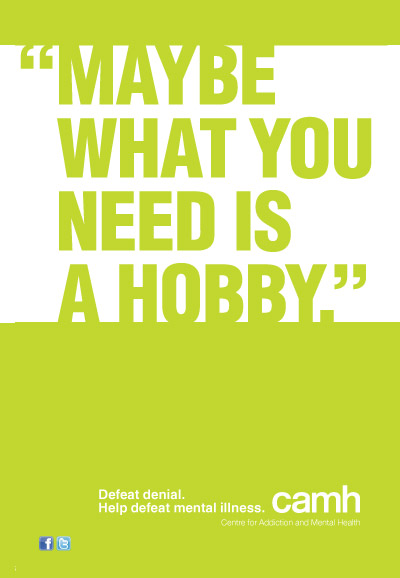
3-day
September 2, 2012
A few years after graduating from University I noticed that I wasn’t very happy. By all accounts I had no reason to feel this way: a decent career, great friends, a healthy family, nothing to complain about. And yet I couldn’t shake the feeling that some days I didn’t want to get out of bed.

Figure 1: Probably Not the Answer
I had (and still have) friends who suffer from various forms and intensities of depression1. I did not realize at the time just how prevalent mental illness was, but I still knew that I didn’t want any part of it. I was genuinely worried that I might be suffering from more than just the blues.
I wasn’t sure, so I decided to implement what at the time seemed like a pretty clever lifehack. Every morning I would log, on a scale of 1-10, how happy and energized I felt. Just one number. And then based on what I wrote, I would choose my activities accordingly.
If the number was high, say 7 or above, I would go try to be all that I could be. If the number was 3 or lower, I would indulge myself in low-effort tasks and usually just spend the day watching movies and playing video games. I was working from home and mostly independently at the time so I didn’t have to deal with going into the office every day. That was a big help in pulling this off.
I had some simple rules during these low-energy days (that I later dubbed “3-days”). No command decisions, no new projects, and no difficult work. Any time I found myself doubting the direction my life was taking, questioning my important relationships, or impatiently re-thinking a major work initiative I would remind myself that it was a 3-day, and I didn’t make these kinds of moves on a 3-day.
This was a big relief. It was an instant excuse to short-circuit the downward spiral of doubt, fear, anxiety and guilt that I remember feeling during those days. And I got a lot of gaming in too.
I started to find that 3-days were often followed immediately by 5- or 6- days, which were then often followed by 7-, 8- or 9- days. It was rare that I had two 3-days in a row and I don’t think I ever had three in a row.
As soon as I realized this my 3-days became even less stressful2. I became confident that the way I felt right now wouldn’t last long. If I just concentrated on taking care of myself today and not doing too much damage I would be better equipped to face the world the next day. Or the day after. After a few months I didn’t need the log any more.
I still have 3-days. I think everyone does. But recognizing them, and acting accordingly, have worked for me so far.
Footnotes:
By describing my own experiences I do not mean to trivialize the painful and substantially more complicated forms of mental illness suffered by so many of us. This summer the Center for Addiction and Mental Health (CAMH) ran a public awareness campaign in Toronto to address just how uninformed, dismissive, and hurtful we can be when faced with a friend or relative suffering from this kind of condition. Even though I consider myself not completely ignorant on the subject, some of the billboards, like the one I linked above, gave me pause, because I think I might have actually said these things to friends. If you think you might need help, please talk to a pro.
Another example of why I think tracking can be such a powerful tool.
